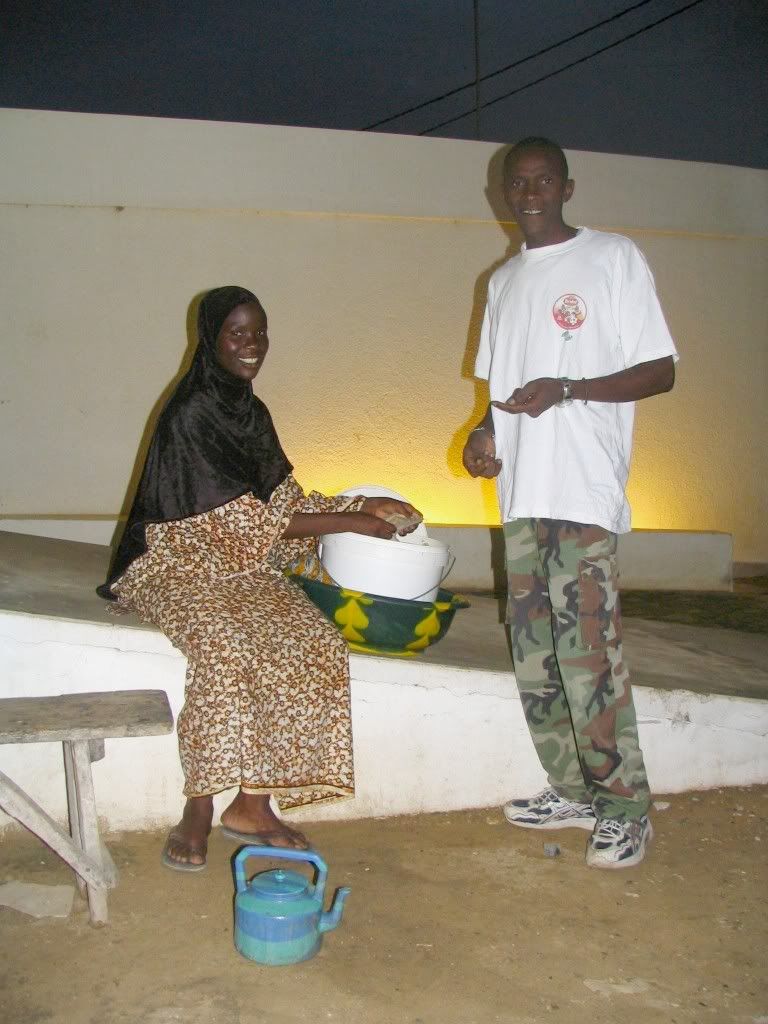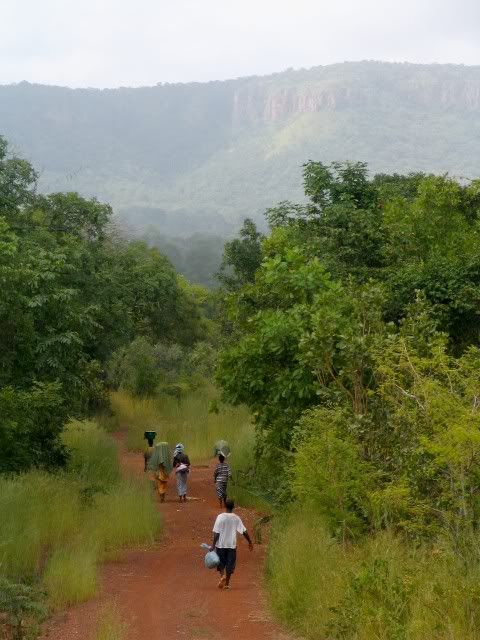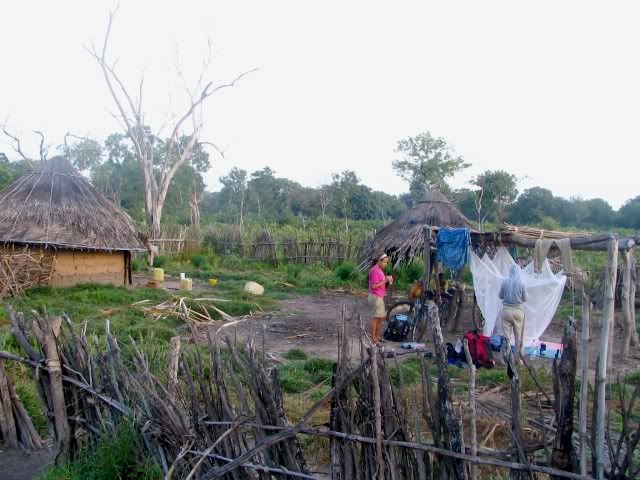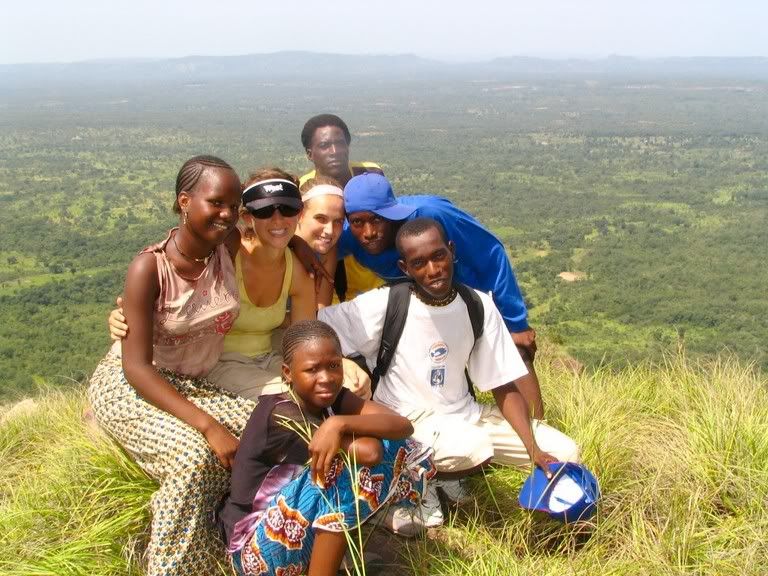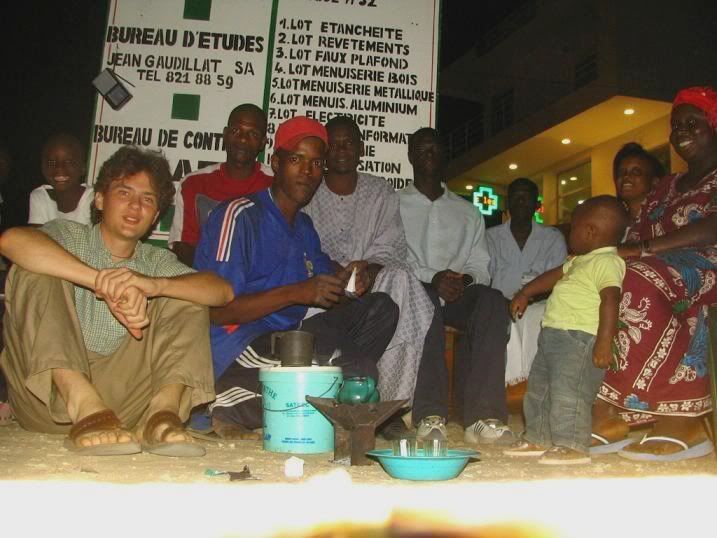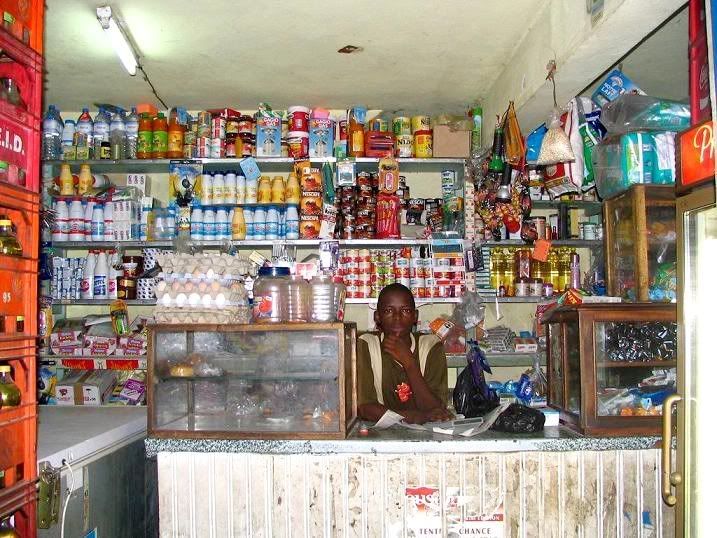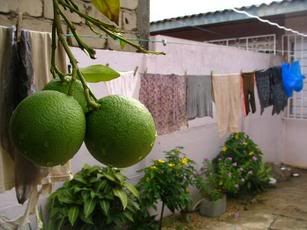Dem nanu giis 'montagnes' yi - We went to see the mountains
Well, we didn’t quite fall to the ground and weep at the sight of them, as does many a poor shepherd, according to my friend Sadjo Diallo, but after fume chocked Dakar and the vast dusty plains of the north, the low mountains of southeast Senegal were a welcome, even astonishing sight. If you haven't heard anything about the trip I took with two friends during our October break (and you're exceptionally interested) scroll down a few entries to read the facts before your attempt to finish this long, rambling description.
(Jenise and Maren on the path from Kedougou to Dindefelo. Note recently-purchased sleeping mats: the best 3000 CFA spent all week)
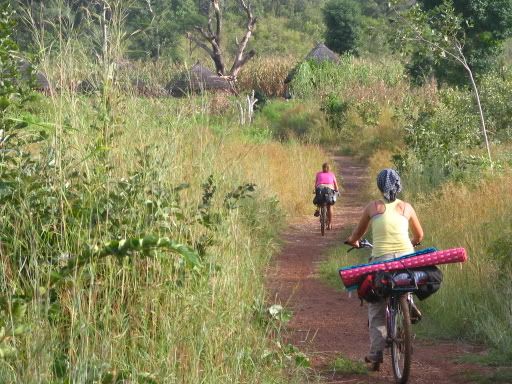 From Dakar, we sped farther and farther south in first one and then another battered sept-place (an ancient Peugot station wagon, pocketed with dents and bangs, producing inumerable strange sounds, and famous for swerving violently into oncoming traffic in order to avoid a pothole). Once past the transport hub of Tambacounda, I pressed my face against the greasy glass of the side window (for which I was grateful - the middle seat had only a wooden board). The forests of the bush became denser, the trees became tall and proud, and I recognized fewer and fewer species. As villages rushed by, the thatched roofs became round instead of square, woven from a new type of palm. As the first, rather tame hills appeared, we shook each other awake excitedly, and when the ground dipped away before us, just before we plunged into alarming turns, we held our breath to watch the bush slope away, thick and heavy with twilight. In Niokola Koba National Park, a grey troupe of (vervet?) monkeys scattered before us (our drivers philosophy was to always honk compassionately at animals in danger of being hit; but never to slow down). The monkeys had us laughing and clapping in the back of the station wagon, drawing tired looks from the young Senegalese men in the middle row: it was undenaibly a 'toubab moment.'
From Dakar, we sped farther and farther south in first one and then another battered sept-place (an ancient Peugot station wagon, pocketed with dents and bangs, producing inumerable strange sounds, and famous for swerving violently into oncoming traffic in order to avoid a pothole). Once past the transport hub of Tambacounda, I pressed my face against the greasy glass of the side window (for which I was grateful - the middle seat had only a wooden board). The forests of the bush became denser, the trees became tall and proud, and I recognized fewer and fewer species. As villages rushed by, the thatched roofs became round instead of square, woven from a new type of palm. As the first, rather tame hills appeared, we shook each other awake excitedly, and when the ground dipped away before us, just before we plunged into alarming turns, we held our breath to watch the bush slope away, thick and heavy with twilight. In Niokola Koba National Park, a grey troupe of (vervet?) monkeys scattered before us (our drivers philosophy was to always honk compassionately at animals in danger of being hit; but never to slow down). The monkeys had us laughing and clapping in the back of the station wagon, drawing tired looks from the young Senegalese men in the middle row: it was undenaibly a 'toubab moment.'
The first time we actually saw the 'mountains' was on a red gravel path through the bush to the village of Dindefelo, which took us all of one night and half the next day to reach, despite the assurance of multiple parties that it couldn't possibly be more than 2 hours. A line of bluffs and dense green along the horizon, these mountains seemed a far more appropraite border with Guinea than than the invisible line through the remote plateau beyond.
Alright, that's enough over-dramatic description for now. This may come as a surprise, but our trip didn't actually unfold like a Victorian travel journal. It was a bit adventurous at times, but for some reason never seemed beyond the believable.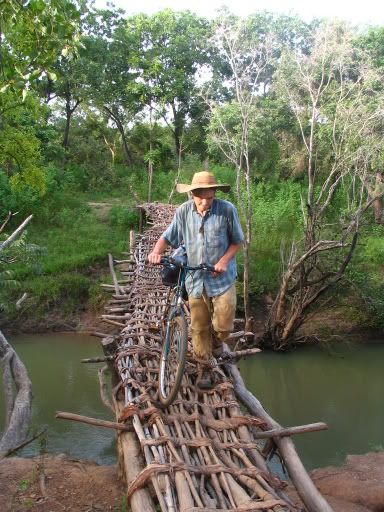 Our initial intention was to bike from Kedougou, Senegal, at the end of the main road of Tambacounda, into the mountains of the Fouta Djalon and reach the town of Mali, Guinea. What's more, we were going to do so by leaving on Saturday afternoon and arriving on Sunday for Mali's big lomé (local market). Just to take it to that next level, we were going to do all this without a Guinean visa, by taking a bush track that bypasses the border post. As it turned out, this plan was a tad bit ambitious. Now that we're back, we better understand the exagerated gasps and bursts of friendly laughter we received from the old Peul men we passed on the rough path to Dindefelo. "These little toubabs, fresh in from the city, were going to carry their silly American bikes up all 8 mountains to Mali?? They must be crazy, and are probably capable of anything."
Our initial intention was to bike from Kedougou, Senegal, at the end of the main road of Tambacounda, into the mountains of the Fouta Djalon and reach the town of Mali, Guinea. What's more, we were going to do so by leaving on Saturday afternoon and arriving on Sunday for Mali's big lomé (local market). Just to take it to that next level, we were going to do all this without a Guinean visa, by taking a bush track that bypasses the border post. As it turned out, this plan was a tad bit ambitious. Now that we're back, we better understand the exagerated gasps and bursts of friendly laughter we received from the old Peul men we passed on the rough path to Dindefelo. "These little toubabs, fresh in from the city, were going to carry their silly American bikes up all 8 mountains to Mali?? They must be crazy, and are probably capable of anything."
(above: walking my bike across the easy bridge en route to Dindefelo)
